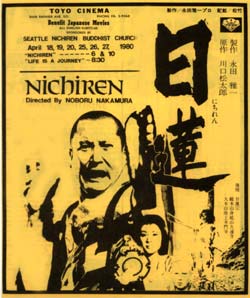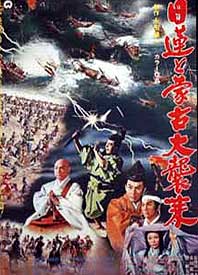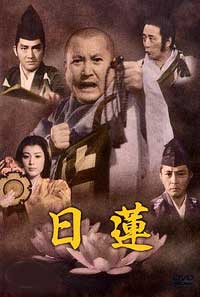In the title role of Noburo Nakamura's Nichiren, as in Kinnosuke's earlier religious epic of Shinren, Kinnosuke is thoroughly capable of capturing a sense of a monk's conviction & devotion, as well as a touch of his madness.
The life of the 13th Century monk was marked by a militant form of Buddhism perhaps equivalent to Jehova's Witnesses in the west, a religion for the lower classes that requires no wisdom or study to find enlightenment, but only a pure-hearted devotion to the all-encompassing importance of the Lotus sutra, namyo-ho-renge-kyo, chanted endlessly so that all one's wishes can come true.
 As Nichiren inspired a lot of modern crackpots, Kinnosuke has made the easy & likely accurate assumpton that like his followers, he wasn't quite all there. As Nichiren inspired a lot of modern crackpots, Kinnosuke has made the easy & likely accurate assumpton that like his followers, he wasn't quite all there.
Kinnosuke wrote the script so the nature of Nichiren is more than just how he's acted. He's shown as being haunted by guilt over his family, & to have a relationship with his sister (Keiko Matsuzaka) that borders on unnatural.
Because Nichiren sways between neurosis & a zealot's rage, Kinnosuke has ample opportunity to play a bigger-than-life figure in the biggest manner possible, without risk of coming off as hammy excess since it's all quite appropriate for the character.
With an impressive cast including Takashi Shimura, Kyoko Kishida, Takahiro Tamura, Kunie Tanaka, Katsuo Nakamura, Mitsuteru Nakamura & Toshiyuki Nagashima, Nichiren is a poker-faced biographical film that shows fantastical but real incident's of the sainted monk's life:
We see how he used to Lotus sutra to call forth the kamikaze winds to destroy the fleets of Korean invaders; how lightning struck the sword of the executioner who was supposed to strike Nichiren's head from his shoulders; & all the more mundanely aggressive practices & conversions he struggled to achieve during his journey's throughout Japan.
The cinematography is lush & beautiful so that even poverty has a certain unlikely prettiness, yet the sufferings of impoverished peasants devastated by alternating drought & flood, topped off with earthquake, conveys adequate how Nichiren was able to prey upon misfortune to enforce conversions.
And we see through these portraits of catastrophe & poverty the root of why it is that it is an "outsider's" religion even in modern times: the loonies, the outcasts, the unutterably lonesome, all those who have not been able to ride Japan's prosperity to a place of comfort or status.
The film is such a good balancing act that if you're not a militant style of Nichiren Buddhist, you can nevertheless see what a colorful, eccentric, interesting, bizarre monk he was, a fellow well worth seeing a movie about. The film does not require the viewer to share the religious point of view to greatly enjoy it.
Yet for someone who is indeed a follower of Nichiren's aggressive form of Buddhism, & perhaps run one of the profitable Nichiren franchises, the film is generally respectful since even those who love him as their personal saint are usually willing to admit he was in many ways quite troubled, this being one reason he so well understood troubled people.
 Other films have tackled the life of Nichiren. Teinosuke Kinugasa's The Sun (Nichiren, 1953), based on a 1923 novel by Riichi Yokomitsu (1898-1947). It was filmed using an inferior full-color process, & was a remake of Kinugasa's lost silent version The Sun (Nichiren, 1925) starrimg Ennosuke Ichikawa. Other films have tackled the life of Nichiren. Teinosuke Kinugasa's The Sun (Nichiren, 1953), based on a 1923 novel by Riichi Yokomitsu (1898-1947). It was filmed using an inferior full-color process, & was a remake of Kinugasa's lost silent version The Sun (Nichiren, 1925) starrimg Ennosuke Ichikawa.
The pioneer chambara director Daisuke Ito did his silent version a year later, Nichiren (1926), the same year as Minoru Murata scripted & directed the two-part Nichiren: Zempen & Nichiren: Kohen.
So far as I'm aware the majority of the silent versions don't survive, or survive only as fragments. A bit over a half hour of Jiro Yoshino's Nichiren shoin: Takinokuchi honan (1921) exists.
Kunio Watanabe directed Nichiren to Moko Dai-shurai (1958), with early use of full color scope, sometimes shown on college campuses in the US, but the dvd (as I write this) is not available for our zone or with subtitles.
It stars Kazuo Hasegawa as Nichiren & featured both Raizo Ichikawa & Shintaro Katsu, & many more huge stars, at an epic length approaching two & a half hours.
Some of its scenes, like the attempt to behead Nichiren & the intervention of lightning, are framed very similarly in Kinnosuke's film. The poster shown last on this page is for Watanabe's film.
copyright © by Paghat the Ratgirl
|

 As Nichiren inspired a lot of modern crackpots, Kinnosuke has made the easy & likely accurate assumpton that like his followers, he wasn't quite all there.
As Nichiren inspired a lot of modern crackpots, Kinnosuke has made the easy & likely accurate assumpton that like his followers, he wasn't quite all there.